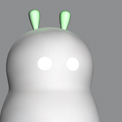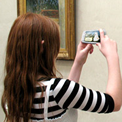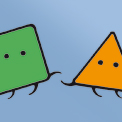Footprints is a network of interactive objects for creating and sharing illustrated stories between parents and children. The project’s aim is to involve parents into their children’s everyday lives, by sharing an intimate moment like telling a story. Footprints is especially conceived for modern working parents, often busy, who are away from family life and find it difficult to follow their children’s growth and development. [More]
Games
Footprints: Interactive storytelling for parents and children
14 April 2013 – 7.02 pmLexis il mostro: Interactive game to support the skills of dyslexic children
13 April 2013 – 12.41 pmLexis il mostro is an interactive game for dyslexic children which aims to support the processes of reading, memorizing and association in a kinestethic, ludic and amusing way.
It is designed for Sifteo Cubes, a new game platform with mini-screen and proximity sensors, that allows the rise of a new experience.
[More]
pigmento: learning about colour synthesis
6 August 2011 – 10.40 am
Pigmento is an interactive table which allow kids to play and learn about the subtractive color synthesis. Over the surface there is white coarse salt, videoprojected from the bottom. The plane is divided in two concentric parts: primary colors at the borders and derivates in the centre. According to the amount of moved colors from the borders, it is possible to get all derivates, and to get back anytime. [More]
Briciole: An interactive table game for children about healthy eating
4 July 2011 – 6.37 pm
Briciole (Italian word for ‘crumbs’) aims to make children more aware of nutrition and related issues. An interactive tabletop, a tangible user interface, allows them to play and learn about food. Several mini-games let children have fun with their friends while testing what they know and maybe learning something new. Tangibility makes the interaction stronger and involves participants in a more personal way. [More]
Famfizzys: Interactive toys powered by the human body
3 May 2010 – 11.39 am The human body is rich source of expendable energy. Through their moods and behaviours the Famfizzys show children the energy they produce as they walk. The child must take care of his Famfizzy puppet in order to keep it alive and healthy. While looking after it he keeps track of his bodily activity day by day. He appreciates energy and its costs. The aim is to give a visualization of electricity. [More]
The human body is rich source of expendable energy. Through their moods and behaviours the Famfizzys show children the energy they produce as they walk. The child must take care of his Famfizzy puppet in order to keep it alive and healthy. While looking after it he keeps track of his bodily activity day by day. He appreciates energy and its costs. The aim is to give a visualization of electricity. [More]
FontUp! daily training through play
3 May 2010 – 11.26 am The number of available fonts grow continously: memorizing, recognizing and identifying them is difficult. Inspired by the Brain Training video games developed by Nintendo, FontUp is a new way to learn, an alternative method to be used in parallel with books. It uses play as a tool for memorizing complex forms using an intuitive visual approach based on comparison. [More]
The number of available fonts grow continously: memorizing, recognizing and identifying them is difficult. Inspired by the Brain Training video games developed by Nintendo, FontUp is a new way to learn, an alternative method to be used in parallel with books. It uses play as a tool for memorizing complex forms using an intuitive visual approach based on comparison. [More]
Spook: Interactive museum guide for children
3 May 2010 – 10.53 am Spook is a smart-phone application for children that aims to make their relationship with traditional museums, often designed with adults in mind, more fun and enjoyable. To make children remember the beauty of what they see and the importance of the experience, it is fundamental to give them a new point of view, a different layer of information that catches their attention. [More]
Spook is a smart-phone application for children that aims to make their relationship with traditional museums, often designed with adults in mind, more fun and enjoyable. To make children remember the beauty of what they see and the importance of the experience, it is fundamental to give them a new point of view, a different layer of information that catches their attention. [More]
Demo: A game about democracy
4 April 2010 – 9.50 amDemo is a video game to encourage people to take an interest in the democratic process. It allows users to play and compose music together—but in order to play they must first read news items and vote on opinion polls taken from Yahoo! News: Politics. The research’s target audience is teenagers and young people, aiming to involve them in political debate and make them understand media bias and the importance of free information. [More]
Greengrowers: A location-based game for Venice
19 May 2009 – 12.06 pm Greengrowers is a location-based game for iPhone. Using GPS technology, players can plant virtual seeds in Venetian squares: the aim is to grow and make virtual plants bloom before others do. To make their plants grow, players can use (site-specific) humus, water and sun (from real weather data), and an increasing set of tools. Winners receive real seeds that local institutions will plant in the players’ favourite square. [More]
Greengrowers is a location-based game for iPhone. Using GPS technology, players can plant virtual seeds in Venetian squares: the aim is to grow and make virtual plants bloom before others do. To make their plants grow, players can use (site-specific) humus, water and sun (from real weather data), and an increasing set of tools. Winners receive real seeds that local institutions will plant in the players’ favourite square. [More]


